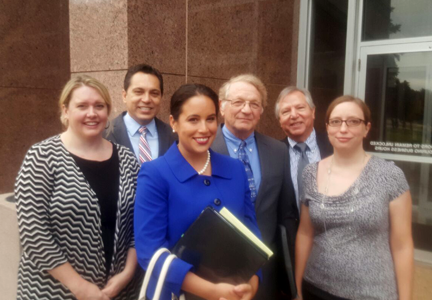• IDRA Newsletter • September 2015 •


MALDEF’s Regional Counsel Marisa Bono presented the argument for the Edgewood ISD plaintiffs. IDRA provided expert analysis and testimony in the trial finding that the system is inequitable and fails to provide adequate levels of funding for educating English language learners and low-income students.
She stated: “The future workforce of Texas attends public school today. How well our students do is how well Texas will do. Every year, the state delivers tens of thousands of young people into our economy who are wholly unprepared for college and career. The state systematically fails to provide an adequate education, and it provides more advantages to students who already live in the most advantaged school districts.”
Mrs. Bono discussed the weighted formula that provides additional funds for educating low income and English language learners as being set at levels “wholly unrelated to the needs of those students… The school finance system is failing low-income and English language learner, or ELL, students who make up over two-thirds of our student population.” Those weights were set three decades ago at half the recommended level at the time and have never been adjusted to meet actual needs. “We want high standards for our kids but you’ve got to give them the resources to get there,” Bono added.
A number of amicus briefs have been filed, including one by the national Education Law Center (ELC) along with several Texas organizations in support of low-income and English language learner students urging the court to affirm the trial court’s ruling. Joining ELC on the amicus brief were the Center for Public Policy Priorities, Mexican American School Board Members Association (MASBA), San Antonio Hispanic Chamber of Commerce, Texas Appleseed, Texas Association for Bilingual Education, Texas HOPE, and Texas NAACP.
Dr. María “Cuca” Robledo Montecel’s op-ed for the Austin American-Statesman was published on the day of the trial, “If the State of Texas Wins this Trial, Texas Children Will Lose.” In it, she stated: “It is vital that the court respect the rights of children across the state who have no other recourse to a better education and a better future. Investing in education means funding our public schools for excellence. We cannot wait any longer.”
Al Kauffman’s op-ed for the San Antonio Express-News was published just before the trail, “Texas Supreme Court has opportunity to improve public education: Constitution requires – and our students deserve – equality.” He is professor of law at St. Mary’s University School of Law and the former MALDEF lead counsel for the Edgewood parties in the school finance lawsuit from 1984 to 2002.
Investing in education means funding our public schools for excellence. Texas must provide equal educational opportunity not for just some – but for all of its children.
Resources for the Texas School Funding Trial
- IDRA has created a dashboard to collect news about the Texas school finance trial for easy access for parents, educators and communities: http://budurl.com/IDRAsfNews
- New Classnotes Podcast episode, “Key Issues in the Texas School Funding Trial,” with David Hinojosa, J.D., IDRA National Director of Policy, who prior to joining IDRA was MALDEF’s lead counsel in the current Texas school finance case: http://www.idra.org/resource-center/key-issues-in-the-texas-school-funding-trial/
- Austin American-Statesman op-ed by Dr. María “Cuca” Robledo Montecel: http://www.mystatesman.com/news/opinion/the-state-wins-this-trial-texas-children-will-lose/kStrsdC0VXRu4zHIKDh3sJ/
- San Antonio Express-News op-ed by Al Kauffman: https://www.houstonpublicmedia.org/news/series/school-funding-fair-or-failing-short/
- Education Law Center amicus brief and overview: http://www.edlawcenter.org/news/archives/other-states/amici-urge-texas-supreme-court-to-affirm-states-school-funding-is-unconstitutional.html
- All amicus briefs on the court’s website: http://www.search.txcourts.gov/Case.aspx?cn=14-0776&coa=cossup
- Infographic on the Texas School Funding Equity Gap: http://www.idra.org/images/stories/Equity_Gap_Jan2014.pdf
- Statement: Court Rules Again: Texas School Funding Must Serve All Students Equitably, August 28, 2014: http://createsend.com/t/r-CFAF512CC306508A2540EF23F30FEDED
- The 50 Most Memorable Quotes in School Finance, compiled by IDRA’s founder, Dr. José A. Cárdenas, in 1994: https://idraed.leadpages.net/50-most-memorable-quotes-in-school-/
- Video of the hearing (Edgewood plaintiff’s argument by Marisa Bono begins at 1:45 and runs to 02:02): http://budurl.com/TXSCSep115
[©2015, IDRA. This article originally appeared in the September 2015 IDRA Newsletter by the Intercultural Development Research Association. Permission to reproduce this article is granted provided the article is reprinted in its entirety and proper credit is given to IDRA and the author.]


